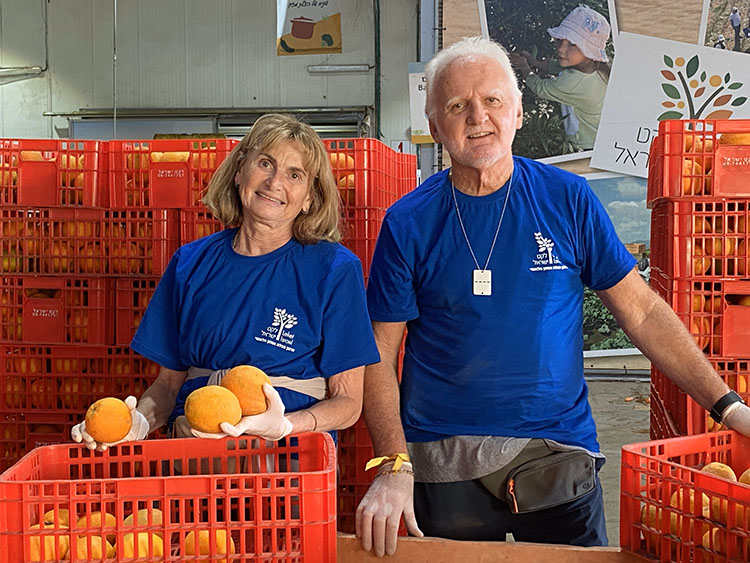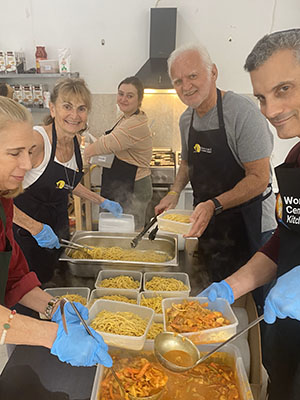
By Donald H. Harrison

SAN DIEGO – Dave and Sylvia Roth travelled thousands of miles from San Diego to Israel in December just so they could have the opportunity to cut vegetables, sweep floors, pack up groceries, and perform stoop labor picking kohlrabi in the fields.
It was not anyone’s idea of a vacation. Rather, they wanted to perform mitzvot. The food that Sylvia cooked on an assembly line was sent every day to three groups of people impacted by the war against Hamas that started Oct. 7th when terrorists crossed into Israel and murdered more than 1,200 people and took some 240 hostages.
Soldiers comprise one group, who are serving not only in Gaza, but near the Lebanese and Syrian borders. A second group is comprised of Israeli citizens who were evacuated from towns and kibbutzim along the volatile borders to relative safety in the Tel Aviv metropolitan area. In the third group are families of hostages who are living in tents at “Hostage Square” outside IDF headquarters in Tel Aviv in an effort to pressure the military to do more to rescue their family members.
Sylvia Roth, who immigrated to San Diego from Johannesburg, South Africa, had been a preschool teacher for 34 years at the Jewish Community Center. Her husband, Dave, also from Johannesburg originally, used to work for a technology company, and later switched to Chefworks, which manufactures uniforms for the hospitality industry. He brought along some aprons for the work crew in Israel to wear.
Back now in San Diego, they told me that with contributions from friends in the local Jewish community, they purchased $5,000 worth of thermal underwear for soldiers serving near the Lebanese border. Some of these were stuffed into large duffel bags along with notes saying that they were sent “with love from your community in San Diego.” Soldiers in one unit who received them—who for security reasons must remain unidentified—sent back a photo showing how very pleased they were with the gift.

The Roths’ 10-day odyssey in Israel began with working for three days at the Citizen’s Kitchen in Tel Aviv, where 15-member teams formed assembly lines to prepare, cook, and pack the food. Sylvia was right at home slicing onions, cutting carrots, and cleaning chickens, but Dave was out of his element. “I tried to cut the onions, but I lasted about three minutes before my eyes started bawling,” he recounted.
“I said, ‘I can’t do that one’ so I washed pots as they were working in the kitchen, and at the end of the day, I was washing down the floors. Whatever they wanted you to do, we would do.” Dave and Sylvia also helped pack food into plastic containers to which notes like “we appreciate you,” and “we love you” were attached for Israeli soldiers to read.
Next they traveled to the Tel Aviv suburb of Ra’anana, where the center for the Leket organization is located. Founded in 2000 by Joseph Gitler of New Jersey, Leket before the war collected from farmers produce that was too late to go to market, then distributed the food to poor people. Since Oct. 7, the food and other necessities, including some of the thermal underwear brought from America by the Roths, has been distributed to Lone Soldiers in the IDF. Lone soldiers are those who have volunteered from overseas, having no immediate family in Israel to go home to.
Finally in Rishon LeZion, another Tel Aviv suburb, they worked in the kohlrabi field, where Gitler came to talk to them about why their labor had become so necessary.
“You have no more Palestinians coming in or people from Asia to work the fields,” Dave explained. “So, to keep these farms going, they depend on (volunteer) assistance. In the past, a lot of work on the plantations was done by reservists, but now they are serving in the military.”
There are fewer farmworkers to feed more people, Dave said. So Leket agreed to supply volunteers.
Sylvia commented that kohlrabi “is the most delicious vegetable, which I had never eaten before. The word means “small cabbage” in German. It is a mixture between cabbage and an apple. You can make coleslaw from it – delicious. It takes three months to grow.”
Besides the pleasure of contributing their labor to a good cause, working with other volunteers from a variety of countries was a memorable perk, the Roths agreed.
“There was no age discrimination – there were young teenagers coming to volunteer, and there were people in their 50’s, 60’s, and 70’s,” Sylvia said. In fact, she added, “there was a 95-year-old lady, an Israeli, who comes every Monday to work for four hours.”
David recalled meeting “one gentleman from Australia who had been there three months, and planned to stay for another three.”
“When we were in the fields, there was a big contingent from France, and there were other contingents from Canada and the U.S. East Coast,” he said. “There was commonality among all these people; they were willing to do whatever was asked.”
The Roths only felt they were in danger twice during their stay. “We had two sirens,” said Sylvia. “The first day we arrived there was a siren and we had to run into a stairwell of a building and then the other siren was while we were cooking. We had to go into the car garage of the building, and you have to wait 10 minutes afterwards because they don’t know where the shrapnel is coming from.”
David said the trip gave him a different perspective on what is happening in Israel. U.S. news reports and social media don’t portray the great amount of unity in Israel for pursuing the war to make certain Hamas can never launch a similar attack on Israeli civilians, he said. But there is no such unity of feeling about the Israeli government, or what should happen after the war ends.
“You talk to one person who will say ‘We need a two-state solution’ and another person will say, ‘Based on this, we will never get to a two-state solution.'”
The Roths will return to Israel in May to attend a family wedding. They’ve been so enthusiastic about their experiences, relatives from South Africa and Canada have said they’d like to volunteer too. So while the newlyweds honeymoon, some of the wedding guests will be slicing those onions and cutting those carrots.
*
Donald H. Harrison is publisher and editor of San Diego Jewish World. He may be contacted via donald.harrison@sdjewishworld.com